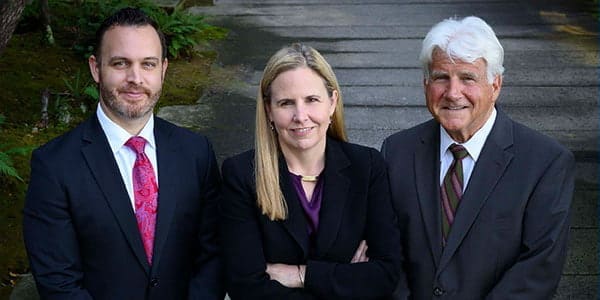Nursing home negligence affects far too many residents in facilities throughout California. A knowledgeable California nursing home negligence lawyer at Galine, Frye, Fitting & Frangos can identify and prove this negligence.
- Why Choose Galine, Frye, Fitting & Frangos for Your Nursing Home Negligence Case?
- Compensation for Nursing Home Negligence Cases
- Nursing Home Negligence in California
- Common Examples of Nursing Home Negligence
- The Consequences of Negligence in Nursing Homes
- Standing up to Nursing Homes and Their Insurance Companies
- What to Do if You Suspect or Know of Nursing Home Negligence
- Get in Touch With a California Nursing Home Negligence Lawyer
Why Choose Galine, Frye, Fitting & Frangos for Your Nursing Home Negligence Case?

If you or a loved one has suffered from nursing home negligence in the Bay Area or anywhere in California, Galine, Frye, Fitting & Frangos is here to support you. Our team of dedicated San Mateo personal injury attorneys offers comprehensive assistance through every phase of your case.
Experienced Legal Representation
Our California nursing home negligence attorneys bring more than 75 years of combined experience in personal injury law. Our history includes a strong track record in settlements, arbitrations, and trial verdicts. We are especially adept at handling complex cases involving serious and life-altering injuries.
Client-Centered Approach
At Galine, Frye, Fitting & Frangos, we treat our clients like family. We understand the emotional and physical toll that nursing home negligence can take on residents and their loved ones. Our team works tirelessly to guide you through the legal process, ensuring you have the support and information you need at every step.
Proven Results
We have a history of fighting vigorously for our clients’ rights and have successfully recovered millions of dollars for victims and their families. We have built our firm’s reputation on 30 years of delivering excellence in the legal field, particularly here in the Bay Area.
Commitment to Fair Compensation
Holding negligent nursing homes accountable requires a strong advocate. Our firm works hard to recover the compensation you deserve and demand justice on your behalf. We have the necessary resources, skills, and legal knowledge to pursue an effective settlement or verdict promptly.
Choosing Galine, Frye, Fitting & Frangos means choosing a law firm that stands firmly by your side, fighting for your rights with dedication, compassion, and a proven track record of success. We are here to help you through this challenging time with the goal of achieving the most favorable outcome for your case.
Compensation for Nursing Home Negligence Cases

The compensation you recover from a nursing home negligence claim accounts for the financial, physical, and emotional harm resulting from the facility’s negligence.
Depending on the circumstances, you could demand compensation for:
- Medical costs for treating injuries or illnesses resulting from the negligence
- Costs of psychological or psychiatric treatments
- Expenses for rehabilitative therapies
- Costs for necessary future medical care
- The resident’s pain and suffering
- Emotional distress and mental anguish
- Loss of enjoyment of life
- Compensation for physical disability or disfigurement
- Costs related to transferring to another facility
- Reimbursement for out-of-pocket expenses
- Lost income or financial support, especially in wrongful death cases
- Funeral and burial expenses in cases of wrongful death
- Legal fees and associated costs
Nursing Home Negligence in California
In California, nursing home negligence and abuse is significant and growing.
The California Association of Health Facilities and the Office of the Attorney General illustrate the extent of this disturbing issue:
- Growth of Elderly Population: Projections indicate a significant increase in California’s elderly population is imminent. By 2025, the number of California seniors will increase to 6.4 million. The number of adults 65 and older likely to need long-term care will nearly double from 2010 to 2030.
- Nursing Homes in California: The state has approximately 1,230 licensed long-term care nursing facilities. This includes both stand-alone nursing homes and those attached to hospitals. Every year, these facilities care for more than 400,000 Californians.
- Residency in Care Facilities: Approximately 110,000 Californians currently live in licensed nursing homes, and another 150,000 live in residential care facilities. Experts estimate that 150,000 more reside in unlicensed assisted living facilities.
- Costs and Occupancy Rates: The average cost for a patient in a skilled nursing facility in California was about $304 per day in 2020, which amounts to nearly $110,960 annually. Occupancy rates in these facilities are around 87 percent. Most residents (88 percent) receive discharges after three months or less, with only six percent staying for a year or more.
- Demographics of Residents: Women make up 58 percent of nursing home residents, while 42 percent are male. Notably, there is an increasing trend of younger individuals (ages 45 to 74, making up 43 percent of residents) staying in these facilities for short-term rehabilitation.
- Concerns of Abuse and Neglect: Many residents, especially those with dementia, face the risk of improper sedation or restraint with antipsychotic drugs. In just one year, reports indicated that 13 percent of all complaints to the California Office of the State Long Term Care Ombudsman involved abuse, gross neglect, or exploitation. This was more than double the national rate, which is an average of five percent.
Common Examples of Nursing Home Negligence

Nursing home negligence occurs when nursing homes fail to provide adequate care to their residents. This can lead to serious physical and emotional harm that compromises health, comfort, dignity, safety, and quality of life.
Several common forms of negligence in nursing homes pose different risks to residents:
- Inadequate Medical Care: One common example of negligence is inadequate medical care. This occurs when nursing homes fail to provide proper medical attention to residents. For instance, facilities might overlook symptoms of illnesses, delay necessary medical treatments, or fail to administer care at all. This can worsen residents’ health conditions or cause them to develop new issues.
- Poor Hygiene and Sanitation: Neglecting hygiene and sanitation is another typical form of negligence. Residents often rely on staff for help with bathing, grooming, and maintaining personal cleanliness. If the staff fails to assist with these basic needs, residents can suffer from infections, skin conditions, and overall deterioration in health.
- Malnutrition and Dehydration: Nursing homes must ensure that residents receive adequate nutrition and hydration at all times. Negligence in this area can occur when facilities do not provide residents with sufficient or appropriate food and water. This can lead to weight loss, weakness, and a host of other health problems.
- Lack of Supervision and Safety Measures: Failing to provide adequate supervision and safety measures is also a form of negligence. Residents, particularly those with poor mobility or cognitive issues, require constant supervision to prevent accidents, such as falls. Inadequate safety measures can also include poorly maintained facilities or a lack of safety equipment, both of which increase the risk of injuries.
- Emotional and Social Neglect: Emotional and social neglect happens when facilities isolate or ignore residents or fail to provide opportunities for social interaction. This form of negligence can lead to depression, anxiety, and a sense of abandonment, significantly diminishing the resident’s quality of life.
The Consequences of Negligence in Nursing Homes

Nursing home negligence can have severe and lasting consequences for the elderly residents in these facilities. Below are some common examples.
Deterioration of Physical Health
One of the most immediate consequences of nursing home negligence is the deterioration of a resident’s physical health. This can manifest as a worsening of existing health conditions, the development of new medical issues, or signs of untreated injuries.
For instance, if a resident falls due to lack of supervision and does not receive prompt medical care, they might suffer from long-term mobility issues or chronic pain.
Psychological Trauma
Residents often experience psychological trauma as a result of negligence. This includes feelings of fear, anxiety, depression, and loneliness. These emotional effects are especially likely when residents experience neglect, isolation, or lack of proper social and emotional support.
This trauma can lead to a decline in overall mental health and a decrease in the quality of life.
Increased Vulnerability to Illnesses and Infections
Neglect in maintaining proper hygiene and sanitation makes residents more vulnerable to illnesses and infections. Poor hygiene practices can lead to skin infections, urinary tract infections, and other health complications. Bed sores are a common example.
Without prompt and adequate treatment, these conditions can become severe, especially in elderly individuals with weaker immune systems.
Increased Risk of Falls and Injuries
Negligence in providing safe environments in nursing homes often leads to an increased risk of falls and injuries. This is particularly critical for elderly residents, who often have fragile bones and slower recovery rates.
Falls can result in serious injuries like fractures, head trauma, or even life-threatening conditions, especially if residents do not receive prompt and appropriate care.
Worsening of Chronic Conditions
Residents in nursing homes frequently have chronic conditions that require consistent and specialized care. Negligence in addressing these conditions, whether through inadequate medication management, insufficient medical care, or lack of monitoring, causes them to worsen significantly. This could mean more frequent hospitalizations, increased pain, or a rapid decline in overall health.
Social Withdrawal and Isolation
Long-term neglect can lead to social withdrawal and isolation among nursing home residents. When facilities consistently ignore residents’ emotional and social needs, residents can become withdrawn, less communicative, and lonely. This isolation can exacerbate feelings of anxiety and depression, severely reducing their mental and emotional well-being.
Reduced Quality of Life
Overall, nursing home negligence significantly reduces the quality of life for residents. Residents without proper care or attention often suffer from a loss of dignity, lack of independence, and decreased enjoyment of life.
The cumulative effects of physical, emotional, and psychological neglect can lead to a sense of hopelessness and helplessness that worsens health outcomes.
Standing up to Nursing Homes and Their Insurance Companies

Standing up to nursing homes and their insurance companies is a challenging task for many victims and their families. These institutions and their insurers typically have considerable resources and legal teams bent on protecting their interests. This makes it difficult for individuals to confront them alone.
One of the main reasons it’s hard to challenge nursing homes is the complexity of the legal and medical issues at play. Understanding the intricate laws governing nursing homes and proving negligence or abuse requires specific knowledge.
Moreover, nursing homes and their insurers often use their significant legal resources to dispute claims. They typically attempt to minimize the severity of the situation or deny responsibility altogether.
This is where our California nursing home negligence lawyers can make all the difference. An attorney with experience in nursing home negligence cases understands all these details and can prepare your case accordingly. They have the skills to gather necessary evidence, such as medical records and expert testimony, to build a strong case.
Our lawyers also recognize the tactics that nursing homes and their insurance companies use and can effectively counter them to protect your rights.
What to Do if You Suspect or Know of Nursing Home Negligence
If you suspect or know of nursing home negligence, take immediate and appropriate action:
- Speak with the resident privately to understand their point of view.
- Observe the resident’s physical and emotional condition closely.
- Take note of any changes in the resident’s behavior or health.
- Document any signs of possible neglect or abuse.
- Visit the nursing home unexpectedly at different times.
- Talk to other residents and their families about their experiences.
- Review the resident’s medical records for inconsistencies or lapses in care.
- Take photographs of any physical signs of neglect or abuse.
- Keep a record of all communications with the nursing home staff.
- Contact our California nursing home negligence attorneys as soon as possible.
- Inquire about the qualifications and training of the nursing home staff.
- File a complaint with the state’s department of health or licensing authority.
- Contact the resident’s physician to discuss your concerns.
- Seek a second medical opinion if necessary.
- Monitor the resident’s financial accounts for unusual activity.
- Check the nursing home’s history for past violations or complaints.
- Speak with an ombudsman who specializes in elder care.
- Gather testimony from witnesses who might have observed neglect.
- Attend care planning meetings for the resident.
- Ask for a care plan review or modification if necessary.
- Explore transferring the resident to another facility if necessary.
Get in Touch With a California Nursing Home Negligence Lawyer

Still have questions about your nursing home negligence case? Reach out to a California personal injury lawyer at Galine, Frye, Fitting & Frangos. We can review your situation and discuss your options at no charge when you contact us at (650) 345-8484 for your initial consultation.